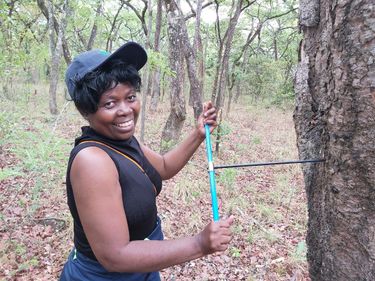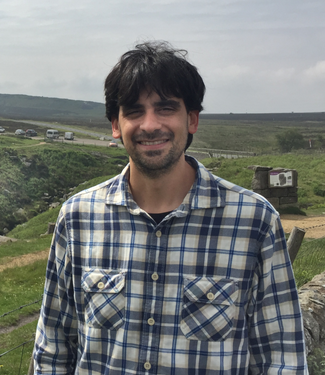
Sessions in which Alienor Lavergne participates
Monday 27 June, 2022
Free, in person and onlineThe stable isotopic compositions of carbon and oxygen (d13C and d18O) measured in tree rings are valuable proxies for reconstructing paleoclimate and are increasingly used as paleophysiological proxies. Applying these proxies in ecophysiology and paleoclimate can be challenging as they rely on complex process-based models and poorly constrained input data. In recent years, h...
Thursday 30 June, 2022
In their book chapter in 2011 Gagen et al. (2011) highlighted the need for stable isotope dendroclimatology to move beyond studies that simply demonstrate ‘potential’. This symposium, more than a decade since this publication, will focus on dendrogeochemical studies that demonstrate that the field has moved beyond studies focused on ‘potential’. In particular, this session will strive to identify compelling new insights into unique aspect...
The interpretation of stable isotopes in a dendroecological framework can provide powerful insights into how trees adjust physiologically in response to the environment. This symposium aims to bring together researchers who use stable isotopes in tree rings to address ecophysiological responses to environmental changes from intra-annual to multi-decadal resolution. We hope this symposium will enable fruitful discussions and new ideas a...
Sessions in which Alienor Lavergne attends
Monday 27 June, 2022
MAIDENiso is a numerical process-based model that allows researchers to simulate the growth of a virtual tree. Using daily meteorological data, the model simulates the physical and physiological processes taking place in the tree and its environment, to produce daily and yearly outputs comparable to dendrological observations. The model has been adapted and used successfully in boreal regions in North America. In an inverse mode, tree-ring obs...
Tuesday 28 June, 2022
Africa is faced with a number of challenges including climate change and ecological disturbance due to various anthropogenic activities. These problems adversely affect the forests and also ecosystem services. My appreciation for the forests motivated me to pursure my undergraduate studies in Forestry. I first applied dendrochronology during my PhD research which focused on understanding the climate change vulnerability of the Zambezi teak forests in Zambia. However, lack of research facil...
Wednesday 29 June, 2022
Dendrochronology is considered one the most precise of all the scientific dating techniques. However, it requires long sequences of tree rings and a master record for both the species and region in question. At the University of Groningen, we have been pioneering a new approach to dating that combines the precision of dendrochronology with the versatility of radiocarbon dating. It relies on the detection of spikes in the annual radiocarbon record, thought to b...
Information garnered from historical timbers and wooden artifacts (e.g. houses, barns, ships) can greatly enhance our understanding of human, ecological, and climate history, especially in regions where few old-growth forests and trees remain, tree longevity is relatively short (less than 300-400 years), and environmental conditions break down wood rather quickly, like in mesic to wet regions. Over the last decade plus, the application of tree-ring techniques on wo...
Current and projected changes in climate are estimated to be from 10 to 100 times faster than the natural adaptive capacity of trees whose generation times are long. As extreme climatic events are becoming more frequent and exert a strong selection pressure on tree populations, there is an urgent need to better characterize the genetic variability involved in the response of trees to climate. There is currently a lack of knowledge on the role of genetic variability in tolerance to climatic...
Information garnered from historical timbers and wooden artifacts (e.g. houses, barns, ships) can greatly enhance our understanding of human, ecological, and climate history, especially in regions where few old-growth forests and trees remain, tree longevity is relatively short (less than 300-400 years), and environmental conditions break down wood rather quickly, like in mesic to wet regions Over the last decade plus, the application of tree-ring techniques on woo...
Thursday 30 June, 2022
How old are tropical trees? This fundamental question has long driven the curiosity of laymen and scientists. But only recently, a great number of studies conducted by many brave dendrochronologists resulted in a significant tree-ring-based knowledge that allows us to start accurately estimating tree ages across the globe. As science goes, not only knowing the longevity of tropical trees is essential to understanding forest dynamics and its role in biogeochemical cycles, but one must also ...
Dendrochronological archives in the tropics of the Americas have been under-studied for a long time. Some of the challenges include the Identification of tree-ring boundaries in certain tree species, absence of winter dormancy associated to low temperatures in most of the cases, and logistic difficulties of fieldwork in remote sites. However, part of the slow progress is also related to the fact that historically much less resources have been inv...
Dendrochronological archives in the tropics of the Americas have been under-studied for a long time. Some of the challenges include the Identification of tree-ring boundaries in certain tree species, absence of winter dormancy associated to low temperatures in most of the cases, and logistic difficulties of fieldwork in remote sites. However, part of the slow progress is also related to the fact that historically much less resources have been inv...


